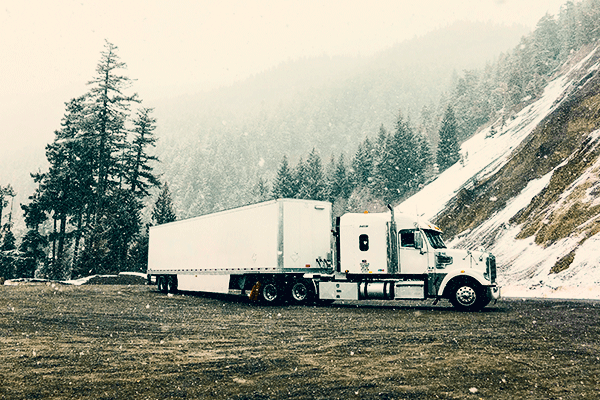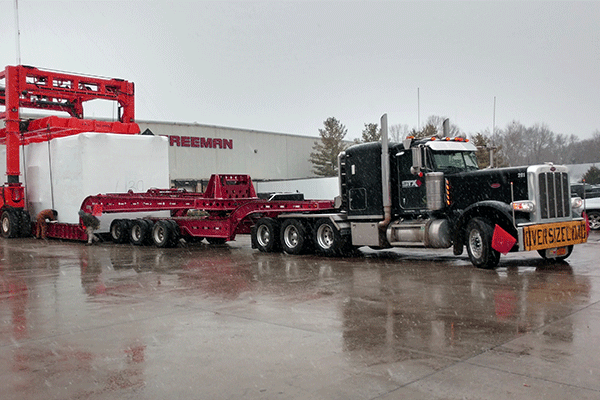
Choosing a freight brokerage shouldn't just come down to price or capacity. The size of the brokerage you work with can directly influence service quality, communication, reliability, and how well your freight strategy holds up when the market shifts.
Some shippers gravitate toward smaller freight brokerages for their personalized service and flexibility. Others prefer larger brokerages for their scale, technology, and network depth.
Neither option is inherently better than the other. The right choice depends on how well a brokerage’s strengths align with your shipping needs.
ATS Logistics has over 30 years of freight brokerage experience, growing along the way— so we're well-versed in the nuances of brokerage operation at any size. We've also worked closely with shippers who have had a wide variety of experiences with other brokers both smaller and larger than us.
In this guide, we'll break down the pros and cons of small and large freight brokerage to help you decide which is the better fit for your business. Let's get started!
Key Takeaways
- Small brokerages offer personalized service but have limited scale and resources.
- Large brokerages provide stability, greater carrier access, and service breadth with less hands-on attention.
- Brokerage size can impact communication and shipper-broker relationships, rate reliability, and flexibility.
- The best choice for your business will depend on your freight volume, complexity, and risk tolerance.

Small Freight Brokerage Pros and Cons
Small freight brokerages are typically defined as those generating under $50 million in annual revenue. This is often, but not always, reflective of the size of their network as well — after all, the more carriers in a broker's network, the higher volume of business they can execute annually.
Like any transportation provider type, there are advantages and disadvantages to working with a small brokerage. Compared to larger brokerages, they tend to operate with leaner teams and a narrower service focus but can often provide a more personalized customer service experience.
Here's a more in-depth breakdown of small freight brokerage pros and cons:
Pros
- Single point of contact
- Simpler communication
- More personalized service
- Stronger shipper-broker relationships
- Focused expertise in specific freight and/or service niches
In general, a small freight brokerage's strength is its customer experience. Shippers often get a single point of contact, making it easier to get answers, stay informed, and resolve issues quickly.
This closely managed communication path leads to a deeper understanding of a customer's business and freight needs, which in turn supports more tailored, successful transportation solutions.
Small brokerages tend to focus on the few services and lanes they know they can execute the best. If your needs fall within their niche, you're in luck — you may well be an ideal customer and therefore get receive better, more attentive service.
Cons
- Less financial cushion during market volatility
- Smaller carrier networks and internal teams
- Fewer service options for complex or diverse freight needs
- Fewer or less advanced tracking technologies
As you might guess, a small freight brokerage's main weakness is tied to its size. Smaller brokerages tend to have smaller carrier networks and fewer staff, which can limit the number of options they can offer for certain lanes or more specialized needs.
That means they may not support a wide breadth of freight types and services compared with larger brokerages, which may matter to you if your shipping needs are varied. They also may not have as robust a suite of tracking technologies or self-service tools, like customer portals, as a larger broker.
Finally, without the financial backing of larger firms, smaller brokers may struggle when market conditions change. This could manifest as price changes, service issues, or general instability in uncertain markets.

Large Freight Brokerage Pros & Cons
For a freight brokerage to be considered "large," it's typically bringing in $50 million or more in annual revenue and operating at a national or global scale.
That larger scope necessitates a larger network, so the biggest freight brokerages maintain relationships with thousands of carriers across the nation.
One of the most significant benefits of working with a large brokerage is access to that breadth and depth of capacity without having to manage those relationships yourself.
On the other hand, as brokerages scale up, their approach to customer service may necessarily broaden in kind — meaning you may have a less personalized experience than you might with a smaller broker.
Here's a roundup of the most impactful large brokerage pros and cons:
Pros
- Stronger financial backing, technology, and staffing
- More likely to honor rates in volatile markets
- Larger carrier networks across many lanes
- Broad range of transportation and logistics services
Large freight brokerages typically have the infrastructure to weather market volatility, stand behind rates, and support high-volume and complex shipping needs.
These are often brokerages backed by an established, recognizable transportation brand (and the corporate financial stability that comes with it) that can invest in the tools and team to execute at scale. Large brokerages are more likely to offer better technology and tracking tools than smaller brokerages, as they have greater resources with which to do so.
As already mentioned, large brokers can have access to hundreds or thousands of carriers, which improves coverage, flexibility, and capacity availability for their customers.
This also allows large brokerages to provide a wide range of freight modes, specialized services, and complex logistics needs.
While you may not get the same level of personalized, niched-down expertise in your freight type or lanes as you might with a smaller, more specialized brokerage, these brokers are still well-positioned to provide quality service.
Cons
- More operational layers, processes, and potential inefficiencies
- Less likely to provide a single point of contact
- Communication may be less frequent
- Service for smaller shippers may be lower priority and less personalized
As the size of a brokerage increases, so too does the complexity of their internal systems and operations. These additional layers of process can introduce inefficiencies and slow response times.
Likewise, you're more likely to be bounced from department to department (and employee to employee) at a larger brokerage. These handoffs can make it harder to get timely updates, clear answers, or consistent communication in general.
In turn, this can leave shippers with the feeling that they're low priority for their brokers, especially if they ship lower volumes. Large brokers can pull in large customers with high volumes of freight, and they may give these accounts more attention than shippers with a smaller footprint.

Small vs. Large Freight Brokerages: How Do They Stack Up Against Each Other?
There's a lot to unpack about the various sizes of freight brokerages, and it can sometimes be difficult to understand how their respective advantages and disadvantages stack up against each other.
To help you visualize the small vs. large freight broker matchup more clearly, we've put together this handy chart. It breaks down broker qualities into five key categories and provides a best-fit shipper profile for each size brokerage.
Remember, these assessments are generalizations about brokerages, which means they may or may not apply to your broker(s) specifically.
In addition to using tools like this article or the chart below, always vet your brokers thoroughly. Collect as much information as you can about any brokers you're considering for your network and use your best judgment to discern what the benefits could be for your unique business.
Small vs. Large Freight Brokerages Head-to-Head Comparison Chart
| Small Brokerages | Large Brokerages | |
| Scale & Stability | Limited scale, less financial stoutness | Large-scale, stronger financial backing |
| Service Scope | Leans toward focused, specialized services in specific lanes or freight types | Broad transportation and logistics service offerings across a wider geographic spread |
| Carrier Network | Smaller, more limited carrier networks | Extensive carrier networks across many lanes |
| Communication & Relationships | Direct communication, personalized service | Less personalized communication and service, especially for lower-volume shippers |
| Operations | Simpler processes, less likely to be bogged down by inefficiencies | Higher degree of internal complexity, more likely to be operationally opaque |
| Best-Fit Shipper Profile | Shippers with simpler freight needs who value hands-on support | Shippers with high volume, complexity, or diverse shipping needs |
How to Choose the Right Sized Freight Brokerage for Your Business
When it comes to choosing a freight brokerage, size isn't everything: the ideal broker for your business will align with what your freight needs are today, how your supply chain operates, and where you're headed in the future.
A small freight brokerage might be a good fit for your business if you:
- Value close communication and fast decision-making
- Ship consistent freight with limited complexity
- Prefer hands-on support and flexibility
A large freight brokerage might be better for you if you:
- Ship high volumes or manage multiple freight modes
- Value strong rate reliability during market swings
- Require broad carrier access and scalable capacity
For many shippers, the decision comes down to tradeoffs between personalization and scale. Understanding those tradeoffs upfront will help to avoid service gaps, pricing surprises, and misaligned expectations.
Bottom Line: Brokerage Size Should Match Your Freight Strategy
Ultimately, there’s no universal “best” freight brokerage size. Small brokerages excel at personalized service and specialization, while large brokerages deliver stability, reach, and operational depth.
The key is aligning brokerage size with your freight complexity, risk tolerance, and growth plans. When those pieces match, shippers are better positioned to protect service levels, control costs, and navigate market volatility with confidence.
If you're on the hunt for the perfect broker for your business's needs, consider downloading our Freight Brokerage Selection Checklist. This free tool provides an easy-to-follow rubric for vetting brokers and ensuring your top choices line up with your strategy and priorities.





